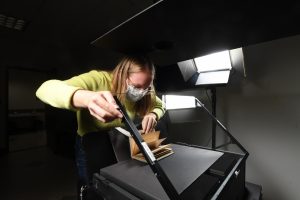
Q: What is the project you’re working on currently, and what is your particular role?
I’m working on the Manuscripts of the Muslim World project, a grant-funded effort by the Council on Library and Information Resources (CLIR) that is shared between Columbia, the University of Pennsylvania, the Free Library of Philadelphia, and Bryn Mawr and Haverford colleges. Along with my colleague Ariel Williams, we photograph the hundreds of Muslim manuscripts contained within our collections and prepare the images to be shared on the Internet Archive and OPenn, where they can be accessed for viewing by anyone.
Q: Obviously, the pandemic has altered physical working conditions for many elements of processing work in the Libraries. How is this project different than it was before March?

Although being on campus to photograph for this project is essential, we were fortunate in that before the library closed we had been completing digitization at a good pace. This meant there were plenty of manuscripts already imaged and ready to finalize for sharing, which we spent months working on remotely. Since returning to campus part-time in August, we’ve had to become even more organized to ensure we make the most of the time we have with the physical materials. Trips into the library are dedicated strictly to imaging, still leaving the post-processing work for home.
Q: It’s common to hear that “everything is digital these days,” which isn’t always the case when it comes to rare and special research materials for many reasons. What’s something you’d want library users to know about the digitization process for this project?
Before digitization, the manuscripts underwent a thorough Conservation review process in order to assess the physical condition of each, and to determine each manuscript’s need for treatment and/or special handling during digitization. Our goal is to make the materials more accessible, but we can not do so if it seriously threatens their longevity. Additionally, our cameras are extremely capable of rendering detail, but there are certain nuances to a page we simply can’t capture. Some of these manuscripts are a thousand years old. So I’d say it’s important to note that not everything can be digitized. The work we’re doing is more important now than ever, but in some cases you ultimately can’t replace sitting with the physical object. (To learn more about how to access physical special collections on campus via research appointment, visit library.columbia.edu/collections/special-collections.)

Q: Can you talk about your training for this type of work?
I have a BFA in Photography from Pratt Institute, which built a foundation for using the required technology. After graduation I worked in book production, where I learned about the anatomy of the book and became more comfortable handling materials. I had never used a book cradle for imaging before, so upon arriving at Columbia I worked closely with colleagues in the Imaging Lab and Conservation to review the intricacies of handling rare and fragile manuscripts in this manner. The knowledge that my colleagues have shared with me after years of doing this work themselves has been invaluable.
_______
More about the Muslim World Manuscripts project from the Libraries: https://blogs.cul.columbia.edu/global-studies/tag/muslim-world-manuscript-project/
Muslim World Manuscript on Twitter: https://twitter.com/MmwProject
Hyperallergic article: https://hyperallergic.com/556697/manuscripts-of-the-muslim-world
To learn more about the work of our staff and other news, visit library.columbia.edu/news.